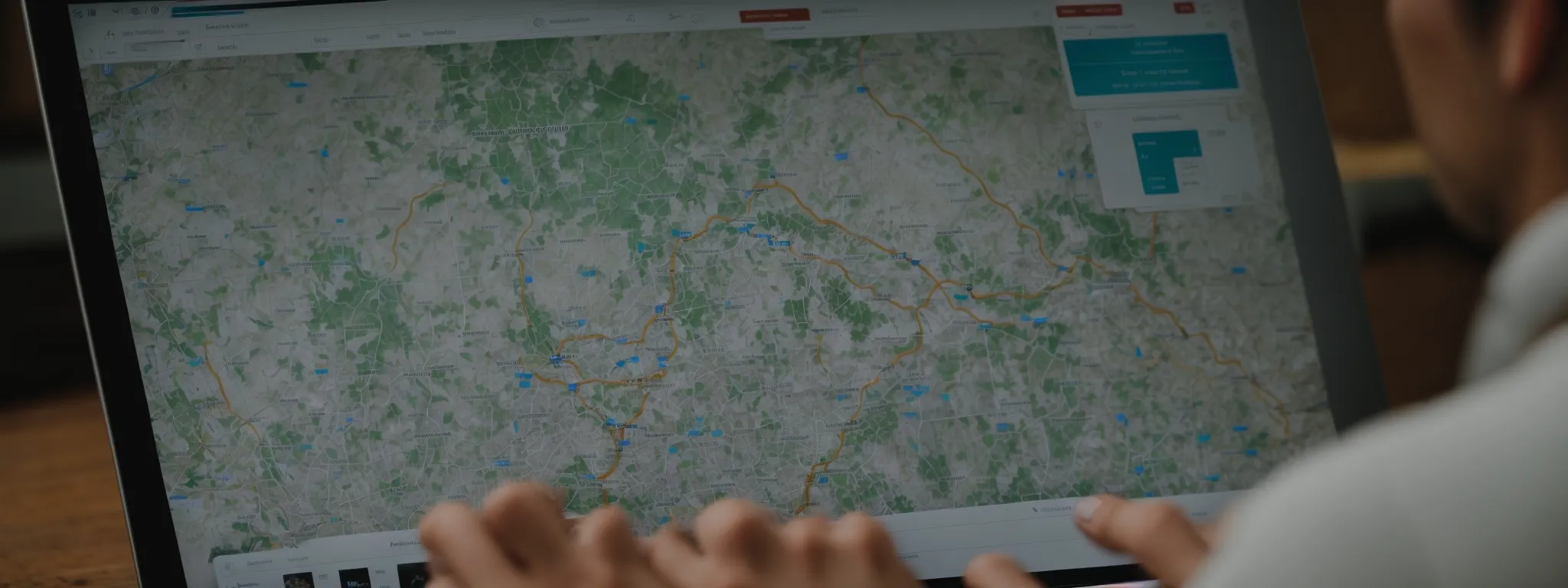Dominate Local Search Results: Local SEO for E-Commerce
Mastering Local SEO for E-Commerce Success In an era where localized searches play a pivotal role in connecting customers with the right ecommerce businesses, mastering Local SEO […]
Mastering Local SEO for E-Commerce Success
In an era where localized searches play a pivotal role in connecting customers with the right ecommerce businesses, mastering Local SEO has become essential for any ecommerce store looking to thrive.
With the nuanced approach of LinkGraph’s SEO services, ecommerce business owners can uncover the potential of a tailored Local SEO strategy that ensures their products and services resonate with the relevant local audience.
The proper adaptation of Local SEO techniques such as optimizing Google Business Profiles, creating a compelling content strategy, and executing a meticulous backlink analysis can dramatically increase a storefront’s visibility, driving both online and foot traffic.
Structuring an ecommerce site to favor local searches involves a sophisticated blend of SEO proficiency and a deep understanding of the Search Atlas tool.
Keep reading to discover actionable insights that will bolster your local online presence and connect your brand with the intended target audience.
Key Takeaways
- Local SEO Targets Community-Based Consumers, Enhancing E-Commerce Visibility and Driving Both Online and in-Store Traffic
- A Robust Local SEO Strategy Requires Optimizing Google Business Profile, Employing Local Keywords, and Establishing Quality Backlinks
- Creating Location-Specific Pages and Incorporating Local Keywords Into Site Content and Backlinks Improves Local Search Engine Relevance
- Customer Reviews on Google My Business Profiles Serve as Social Proof and Elevate a Brand’s Reputation and Local Search Rankings
- Social Media Amplifies Local Content Reach, Fostering Community Engagement and Expanding the Influence of an E-Commerce Brand
Understanding E-Commerce Local SEO Fundamentals

In the arena of digital commerce, Local SEO emerges as a pivotal ally for e-commerce businesses aiming to optimize their online presence and enhance visibility among an engaged, proximate audience.
This specialized SEO strategy focuses on tailoring a company’s online footprint to resonate within the local search ecosystem, effectively positioning their brand at the forefront when customers in the vicinity search for relevant products and services.
With the interplay of distinct elements such as Google Business Profile optimization, localized content creation, and precise Backlink Analysis, Local SEO diverges from its general counterpart by intensifying the brand’s relevance within specific, targeted areas.
Mastering these components not only fortifies an e-commerce enterprise’s market stance but also bridges the gap between virtual engagements and tangible foot traffic—a synergy imperative for the sustained growth of any retail entity operating in the digital sphere.
Define Local SEO and Its Importance for E-Commerce
Local SEO, a strategy tailored for geographical relevance, empowers e-commerce businesses to capture the attention of customers in specific locales, driving both online and physical store traffic. This approach enhances a brand’s visibility in local search results, ensuring products and services are prominently displayed to searchers with intent to engage or purchase within their own community.
For e-commerce entities, the adoption of a robust Local SEO practice is not merely an option but a necessity to outmaneuver competitors and capture a significant market share. It elevates the company’s standing by placing it in direct view of its target audience, ultimately leading to increased conversions and a stronger, more locally-responsive brand image.
Outline the Key Components of Local SEO
The key components of Local SEO encompass a trifecta of critical tactics that, when executed effectively, amplify an ecommerce business’s search performance locally. This integration involves optimizing the Google Business Profile (GBP) to ensure its completeness and accuracy, employing local keywords that align with consumer search behavior, and establishing a network of quality backlinks from reputable local sources to bolster the site’s credibility in local search engine results.
Additionally, the implementation of Schema markup for local businesses supports search engines in parsing ecommerce site information more effectively, contributing to improved visibility in local search queries. Crafting location-specific landing pages for each storefront or service area also plays a pivotal role, enhancing the relevance and reach to the intended local audience, thereby boosting the likelihood of appearing in the coveted map pack and escalating foot traffic to the physical location.
Differentiate Between Local and General SEO
In contrast to the broader objectives of general SEO, which optimize for a global or non-specific audience, Local SEO narrows its focus to cater to community-based consumers and searches. While general SEO amplifies a brand’s reach across vast digital landscapes, Local SEO tailors a business’s online presence to resonate with the locality it serves, connecting an eCommerce store or service provider with its geographical customer base.
Where general SEO leverages a wide array of keywords to captivate a diverse audience, Local SEO hones in on geo-specific terms and customer intent that relate directly to the proximate searchers. This targeted approach often translates to swifter conversions and enhanced local visibility, as businesses are matched with users actively seeking their offerings in the immediate area, a strategy that leverages the nuances of local search behavior to compete effectively within localized search engine results.
Crafting a Local SEO Strategy for E-Commerce

Embarking on the journey of refining a Local SEO strategy for an e-commerce business requires a blend of analytical assessment and strategic planning.
Initially, companies must evaluate their existing Local SEO performance to identify areas ripe for improvement and areas where they already excel.
Establishing measurable objectives is fundamental to mapping the trajectory towards Local SEO success, providing a clear vision for targeted efforts.
Understanding the local market and audience is the cornerstone, as this knowledge lays the groundwork for tailoring tactics that resonate specifically with the community the business seeks to serve.
These initial steps are essential as they form the scaffold upon which a robust Local SEO framework can be meticulously constructed and implemented.
Assess Your Current Local SEO Performance
Before an e-commerce company embarks on enhancing its Local SEO, an assessment of its current landscape is indispensable. This critical analysis involves conducting an SEO Audit, scrutinizing existing business listings for accuracy and consistency, particularly NAP citations, and evaluating the business’s current standings in local search engine results.
LinkGraph’s SEO services offer a comprehensive review of an e-commerce business’s online footprint, taking a deep dive into backlink profiles, on-page elements, and the overall Local SEO strategy. Ensuring each element is analyzed, LinkGraph aids businesses in pinpointing the strengths and opportunities within their local SEO efforts, shaping the foundation for an informed and strategic improvement plan.
Set Measurable Goals for Local SEO Success
As an e-commerce enterprise plots its course through the digital marketplace, setting measurable goals stands as a beacon for Local SEO success. These objectives, whether they pertain to enhancing local rankings, increasing search visibility within specific regions, or amplifying engagement on location pages, should reflect the company’s ambition while remaining grounded in attainable benchmarks.
A clear set of goals operates as the rudder to a Local SEO strategy, enabling businesses to track progress and refine tactics with precision:
- Boosting presence in the Google Map Pack to secure top three listings for high-intent local queries.
- Expanding the acquisition of quality backlinks from local sources to fortify domain authority.
- Improving Google Business Profile elements, including customer reviews, up-to-date NAP information, and posting frequency.
Identify Your Target Local Market and Audience
Identifying the target local market and audience is a crucial step in crafting a Local SEO strategy, as it informs the direction of all subsequent efforts. This process necessitates an in-depth understanding of the locality’s demographics, consumer behavior, and preferences, ensuring an e-commerce business can align its offerings with the specific needs and opportunities within its chosen market.
A nuanced approach allows a company to cater to the unique dynamics of its community, from tailoring marketing messages to optimizing product selection for local relevance. Unearthing these insights paves the way for meaningful engagement and drives a focused campaign that resonates with the local clientele:
- Analyze social and economic traits to tailor site content and product offerings to local preferences.
- Engage in community events or local collaborations to deepen the connection with potential customers and gather valuable insights.
Leveraging Google My Business for Online Stores

In a marketplace where digital and physical crossroads frequently intersect, Google My Business (GMB) stands as a linchpin for driving visibility and reinforcing trust for online stores.
By cultivating a robust GMB profile, e-commerce businesses can not only increase their prominence in local search results but also gain a competitive edge through rich, accurate storefront details and interactive customer reviews.
A meticulously optimized GMB account becomes a central hub for e-commerce retail, crafting a narrative that entices and informs potential customers, acting as a silent salesperson in the vast marketplace of the internet.
Create a Google My Business Account for Visibility
Establishing a Google My Business (GMB) account stands as an essential milestone for e-commerce businesses striving for local visibility. It provides a platform to feature critical business details, such as location, hours, and services, directly to users who are most likely to visit the physical storefront or engage with the online store.
With a GMB profile, e-commerce businesses convey authenticity and provide easy access to information that influences buyer decisions. Impressions crafted through an optimized profile can lead to enhanced local rankings and an uplift in qualified storefront and website traffic:
| Action | Impact on Local SEO | Benefit to E-Commerce Business |
|---|---|---|
| Complete GMB Profile Setup | Higher Relevance in Local Search | Increased Credibility and User Trust |
| Regular Updates and Posts | Consistent Engagement Signals | Improved Interaction with Local Audience |
| Accumulation of Positive Customer Reviews | Boosts Local Search Ranking | Encourages Consumer Confidence and Conversion |
Optimize Your Listing With Accurate Details and Photos
An impeccable Google My Business listing is integral to the optimization process, with precise details and vibrant photos underpinning its effectiveness. Accurate information ensures that potential customers receive the correct data they need to make informed decisions, while quality imagery showcases the products and communicates the brand’s professionalism.
- Ensure every detail, from NAP information to service descriptions, aligns with current operations and offerings to maintain consistency across customer touchpoints.
- Curate a selection of high-resolution photos that reflect the diversity and quality of products, thereby fostering trust and encouraging engagement.
The importance of visuals, in particular, cannot be overstated; they serve as a brand’s visual handshake with the local market, inviting visitors to explore and connect with the e-commerce store. By pairing meticulous accuracy with compelling imagery, businesses enhance their GMB profile’s ability to convert local searches into tangible business outcomes.
Encourage and Manage Customer Reviews to Boost Reputation
Encouraging the inflow of customer reviews on a Google My Business profile is a strategic move that beckons a two-fold advantage for e-commerce businesses. These reviews serve as social proof, bolstering the brand’s reputation and persuading new customers to trust the online store.
Proactive management of these customer reviews, through timely responses and appreciation for feedback, manifests a dynamic customer service outlook. Such interactions not only imbue credibility but also signal to search engines and consumers alike that the business values its clientele and is committed to excellence.
Optimizing E-Commerce Site Structure for Local Searches

A cornerstone of local search engine optimization, particularly for e-commerce websites, is the strategic refinement of site infrastructure to cater to region-specific searches.
This involves crafting location-specific pages that align with the geographic areas a business serves, permeating the site with pertinent local keywords, and ensuring the website’s interface caters seamlessly to mobile users.
These targeted optimizations bear the potential to elevate a site’s relevance in local search engine results, foster a tailored user experience for regional customers, and solidify the brand’s local presence in the competitive digital marketplace.
Create Location-Specific Pages for Better Relevance
In a market where geographic context bears such weight, creating location-specific pages stands as a non-negotiables for e-commerce businesses vying for prominence in local search rankings. These pages, rich with local seo keywords and relevant information like store hours or directions, act as individual beacons attracting searchers directly to a business’s digital doorstep.
LinkGraph’s Search Atlas SEO tool simplifies the process of generating tailored pages for each area or service location, ensuring that content aligns with localized search patterns and consumer behavior. This level of customization not only drives relevance up for local searches but also demonstrates to visitors that the e-commerce site values and understands the nuances of their regional needs.
Implement Local Keywords Throughout Your Site
Ingraining a website with local keywords is a crucial tactic that fosters increased visibility and connects products or services with the community. Executed judiciously by infusing product descriptions, meta tags, and content with geo-centric terms, LinkGraph helps e-commerce sites cater to the linguistic tendencies of their regional audience, enhancing the probability of appearing in relevant local search results.
With LinkGraph’s advanced Search Atlas SEO tool, meticulous keyword research becomes a precision-led endeavor, guiding the selection of terms that align with the genuine search behavior of local consumers. By strategically embedding these keywords, an e-commerce platform demonstrates to search engines its relevance and authority within the local context, championing a more prominent placement in search rankings.
Ensure Mobile-Friendliness for on-the-Go Shoppers
Ensuring an e-commerce site is mobile-friendly remains a critical aspect of Local SEO as it caters to a substantial portion of users conducting searches via mobile devices. To remain competitive in local SERPs, businesses must adapt their online platforms to provide seamless navigation and fast loading times, accommodating the immediacy mobile users expect.
LinkGraph’s SEO solutions emphasize the importance of a responsive website design, which dynamically adjusts content and layout to suit various screen sizes and orientations. This attention to mobile optimization increases the likelihood of capturing the attention of local consumers who are ready to take action, directly impacting a business’s bottom line.
Building Local Citations and Backlinks for E-Commerce

Amidst the intricate web of Local SEO tactics, citations and backlinks emerge as pivotal elements, crucial for establishing an e-commerce business’s domain authority and prominence in localized search landscapes.
By meticulously listing the site on pertinent local directories, forging strategic relationships for backlink opportunities, and infusing location-based keywords into anchor text, businesses enhance their digital footprint and search result vitality.
Such efforts not only reinforce the infrastructural bedrock required for climbing local search rankings but also solidify the online brand’s credibility and relevancy to a precise geographic audience.
Identify and List Your Site on Relevant Local Directories
An integral step for e-commerce businesses in fortifying their local SEO is the meticulous identification and listing on relevant local directories. By securing their presence in these niche directories, businesses amplify visibility within the community, a critical stride in strengthening local search relevancy and domain authority.
LinkGraph’s expansive suite of SEO services aids clients in pinpointing these directories, ensuring an ecommerce site’s details are accurately broadcasted where potential customers are most likely to find them. Accurate and consistent listings across these platforms reinforce the site’s prominence and bolster local search engine credibility, laying a solid foundation for enhanced local discovery.
Develop Relationships for Local Backlink Opportunities
Fostering strategic partnerships with local businesses and industry-specific influencers can yield substantial benefits in terms of local backlink opportunities. LinkGraph supports e-commerce businesses in forging these connections, increasing the likelihood of accruing reputable local backlinks that affirm the company’s standing within the community.
Through collaborative efforts such as sponsorships, local event participation, and Guest Posting on regional platforms, LinkGraph aids clients in broadening their backlink profile. This strategic networking enhances the visibility of an ecommerce site within local search engine results, drawing a direct link between relationship-building and Local SEO enhancement.
Utilize Location-Based Keywords in Backlink Anchor Text
Integrating location-based keywords into the anchor text of backlinks is a nuanced approach to amplify an e-commerce site’s relevance in local search engines. This practice helps search engines discern the geographic focus of the ecommerce business, thereby increasing the chances of ranking well for local searches.
- LinkGraph provides expert guidance in strategically selecting anchor text to boost geographical relevance.
- Anchor text optimization with local keywords helps connect backlinks to the locality, effectively improving local search result positioning.
- The deliberate placement of local search terms in anchor text is critical for signaling search engines about the regional significance of an e-commerce site.
LinkGraph leverages the potency of local SEO by infusing hyperlinked phrases with area-specific language. The company’s meticulous emphasis on such details ensures that backlinks do not just point to an e-commerce site but lead to its enhanced recognition within the area it serves.
Enhancing Local Visibility Through Content Marketing

The catalyst for cementing an e-commerce brand’s authority within a local market is the deployment of a strategic content marketing effort.
Content that resonates with the local audience is pivotal, as it aligns the brand with the community’s pulse, fostering engagement and brand loyalty.
E-commerce businesses stand to gain considerably by infusing their Content Strategy with local events, highlights, and news, reflecting an investment in the locality that transcends mere business transactions.
Leveraging social media networks serves to amplify this localized content, broadening its reach and influencing local search engine optimization outcomes significantly.
Engaged and regionally focused, a brand can become synonymous with community-specific solutions, organically establishing its presence and authority among the target audience.
Craft Engaging Content That Resonates With a Local Audience
To capture the essence of the locality in an e-commerce content strategy, LinkGraph champions the creation of pieces embedded with regional nuance. Engaging content, whether that be blog posts imbued with local cultural references or guides highlighting local events, harnesses the power to resonate deeply with an audience’s sense of community.
LinkGraph understands that content which mirrors the interests and experiences of a local audience can foster a sense of connection and trust. This approach not only positions an e-commerce brand as a relevant player in the local sphere but encourages readers to transition into loyal customers:
| Content Type | Local Relevance | Impact on Customer Engagement |
|---|---|---|
| Blog Posts | Cultural References | Increases Brand Relatability |
| Local Guides | Event Highlights | Builds Community Connection |
Incorporate Local Events and News Into Your Content Plans
E-commerce enterprises can cultivate a palpable community presence by weaving local events and news into their content strategies. Highlighting regional happenings within Blog Writing or social media posts not only boosts local SEO efforts but also positions the brand as an integral thread in the local fabric.
- Spotlight local charity events or sponsorships to underline community involvement.
- Publish insights on regional market trends relevant to the e-commerce offerings.
- Create features on newsworthy local businesses to foster a sense of collaboration and support.
By aligning content plans with the rhythm of community life, online visitors gain a more intimate and relevant experience, drawing them closer to the e-commerce brand. Such strategic content planning leads to reinforced local connections and serves as a pathway to becoming the go-to source for products within the community.
Use Social Media to Amplify Your Local Content Reach
Social media platforms stand as dynamic amplifiers for e-commerce businesses seeking to expand their local content’s influence. These channels facilitate real-time engagement and sharing of regionally-focused content, promptly connecting with a brand’s local followers and promoting broader content dissemination across community networks.
Deploying targeted social media campaigns, LinkGraph equips e-commerce clients with the tools to orchestrate wider content reach, crafting narratives that captivate and spark conversations within the local digital sphere:
| Platform | Content Approach | Local Engagement Goal |
|---|---|---|
| Share community-oriented stories and events | Boost local user interaction and shares | |
| Visual storytelling with a local flair | Increase brand visibility through hashtags and geotags | |
| Participate in local conversations and trends | Engage with local influencers and industry leaders |
Frequently Asked Questions
How can e-commerce businesses leverage local SEO to drive more targeted traffic and increase sales?
E-commerce businesses can harness the power of Local SEO by integrating location-based strategies into their marketing plans to attract more geographically targeted traffic, potentially increasing foot traffic for hybrid business models. This focus on Local SEO leads to enhanced online visibility in local search results and map packs, directly influencing consumer purchase decisions through improved search engine rankings for location-specific queries.
Embracing Local SEO practices is crucial for online storefronts seeking to differentiate their brand and offerings in a competitive digital landscape. LinkGraph’s Local SEO services are tailored to optimize ecommerce websites for local search results, amplifying brand presence in specific locales. Comprehensive strategies include a thorough SEO audit, a custom-tailored content strategy for location pages, and expert application of local business listings with consistent NAP information.
Executing a Local SEO campaign effectively demands meticulous attention to detail and a firm understanding of search engine algorithms. LinkGraph leverages its Search Atlas tool, enabling ecommerce businesses to conduct in-depth keyword research pertinent to their target audience, identify gaps in their SEO strategy, and utilize White Label Link Building for acquiring quality backlinks. This approach underpins the creation of user-centric and search engine friendly content that aligns with customer search intent.
Furthermore, the adaptation of On-Page SEO Services ensures that each relevant product page and landing page are optimized for search engines and user experience, a pivotal factor in boosting conversion rates. Services like GMB profile optimization and schema markup deployment magnify the visibility and attractiveness of ecommerce business listings in the eyes of both search engines and prospective customers.
LinkGraph’s exhaustive repertoire of SEO tools and services assists in various aspects of digital marketing, particularly for ecommerce providers endeavoring to capitalize on local searches. From on-page to off-page factors, implementing a local SEO checklist to guide their optimization efforts ensures businesses do not overlook critical elements that contribute to their online prowess.
In conclusion, ecommerce sites aiming to draw in visitors with pinpoint accuracy will find themselves well-supported with the tailored local SEO strategies, seasoned SEO analysts, and trailblazing tools offered by LinkGraph. Interested ecommerce companies can initiate their journey towards enhanced local search visibility by reaching out to LinkGraph, starting a trial of their comprehensive SEO services designed for meaningful and measurable online growth.
What are the key elements to consider when crafting a local SEO strategy for an e-commerce website?
Crafting a local SEO strategy for an e-commerce website demands meticulous attention to local keywords, optimization of business listings, and leveraging location-based content. A thorough local SEO audit to identify gaps, combined with a strategic approach to building high-quality local backlinks, underpins the efforts to enhance visibility in local search results.
How can optimizing the site structure of an e-commerce website improve its visibility in local search results?
Optimizing the site structure of an ecommerce website can significantly enhance its visibility in local search results by creating a clear, logical, and user-friendly layout that search engines can easily crawl and index. Strategic use of location pages, NAP information, and local keywords ensures that local searchers find the website more relevant to their queries, thereby improving the business’s local search ranking and attracting more geographically targeted traffic.
What role does Google My Business play in enhancing the online presence of e-commerce stores?
Google My Business, branded as Google Business Profile, serves as a critical tool for ecommerce stores, enabling them to appear in local search results and Map Packs, thus enhancing visibility and potentially driving increased web traffic. This platform allows businesses to present vital details like product offerings, business hours, and customer reviews, which contribute to transparent communication and can improve conversion rates for online retailers.
What are some effective strategies for building local citations and backlinks to improve the local SEO of an e-commerce website?
Building local citations and backlinks can significantly enhance an e-commerce website’s local SEO, with strategies including meticulous management of business listings across various platforms and engaging in community-oriented content creation or sponsorship to garner reputable local links. Additionally, LinkGraph’s dedicated local SEO services can help amplify these efforts, providing expert guidance in both targeted backlink analysis and white label link building to position your e-commerce business at the forefront of local search results.
Conclusion
Mastering Local SEO is fundamental to driving e-commerce success, as it ensures businesses effectively target and engage their geographically local audience.
By optimizing their online presence through strategies like creating a robust Google Business Profile, using location-specific landing pages, and incorporating local keywords into site content, e-commerce entities enhance their visibility in local search results.
This focused approach not only leads to increased traffic—both virtual and physical—but also strengthens brand relevance and loyalty within specific market areas.
Furthermore, leveraging tools such as LinkGraph’s Search Atlas SEO, e-commerce sites can accurately assess their performance and deploy precision-led content marketing strategies, including leveraging social media to amplify reach.
Ultimately, incorporating these techniques into a cohesive Local SEO strategy can convert local searches into tangible growth, establishing a brand’s authority and nurturing its relationship with the community it serves.















































































